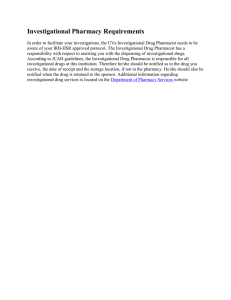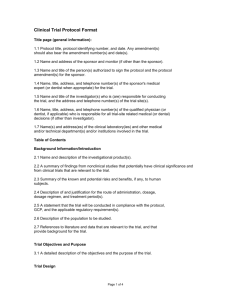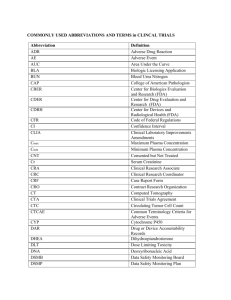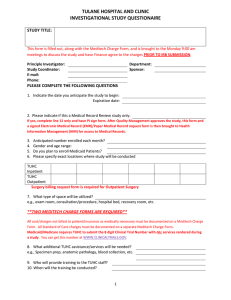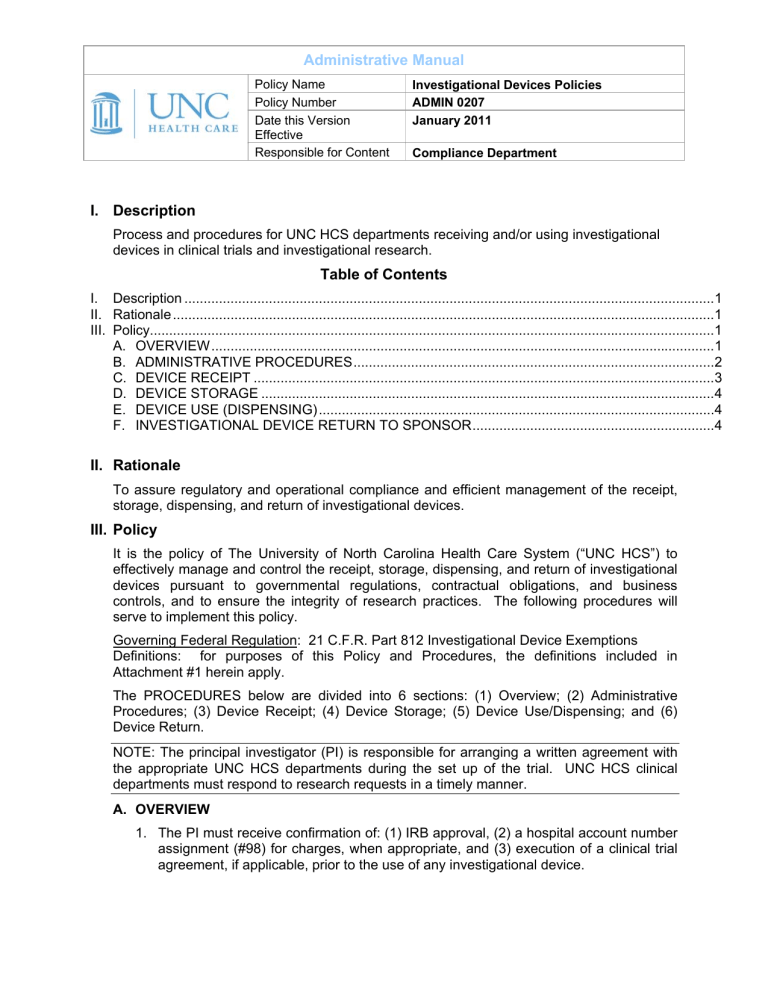
Administrative Manual Policy Name Policy Number Date this Version Effective Responsible for Content Investigational Devices Policies ADMIN 0207 January 2011 Compliance Department I. Description Process and procedures for UNC HCS departments receiving and/or using investigational devices in clinical trials and investigational research. Table of Contents I. Description ..........................................................................................................................................1 II. Rationale .............................................................................................................................................1 III. Policy...................................................................................................................................................1 A. OVERVIEW ...................................................................................................................................1 B. ADMINISTRATIVE PROCEDURES ..............................................................................................2 C. DEVICE RECEIPT ........................................................................................................................3 D. DEVICE STORAGE ......................................................................................................................4 E. DEVICE USE (DISPENSING) .......................................................................................................4 F. INVESTIGATIONAL DEVICE RETURN TO SPONSOR ...............................................................4 II. Rationale To assure regulatory and operational compliance and efficient management of the receipt, storage, dispensing, and return of investigational devices. III. Policy It is the policy of The University of North Carolina Health Care System (“UNC HCS”) to effectively manage and control the receipt, storage, dispensing, and return of investigational devices pursuant to governmental regulations, contractual obligations, and business controls, and to ensure the integrity of research practices. The following procedures will serve to implement this policy. Governing Federal Regulation: 21 C.F.R. Part 812 Investigational Device Exemptions Definitions: for purposes of this Policy and Procedures, the definitions included in Attachment #1 herein apply. The PROCEDURES below are divided into 6 sections: (1) Overview; (2) Administrative Procedures; (3) Device Receipt; (4) Device Storage; (5) Device Use/Dispensing; and (6) Device Return. NOTE: The principal investigator (PI) is responsible for arranging a written agreement with the appropriate UNC HCS departments during the set up of the trial. UNC HCS clinical departments must respond to research requests in a timely manner. A. OVERVIEW 1. The PI must receive confirmation of: (1) IRB approval, (2) a hospital account number assignment (#98) for charges, when appropriate, and (3) execution of a clinical trial agreement, if applicable, prior to the use of any investigational device. 2. Study personnel must use a consistent process for receipt and distribution of all investigational devices that are designated for use in a clinical trial or investigational research. The process must include a communication component allowing for the efficient and timely notification to: (i) the clinical area affected regarding plans for the study and the need for an investigational device inventory; (ii) the PI, stating that the devices have been received and are available for use; and (iii) the clinical area where a patient who needs to use the investigational device is being scheduled. 3. The department with physical control of the investigational device inventory (i.e., the “ancillary department”) must maintain documentation of the specific use of each device by individual study subjects,, consistent with federal regulations, sponsor instructions, and hospital policies. 4. The ancillary department and the PI or the PI’s designee are jointly responsible for documenting the return of unused investigational devices at the completion of a clinical trial or investigational research. Such documentation must be consistent with federal regulations, sponsor instructions, and hospital policies. . 5. All records tracking investigational devices must be maintained at the location where the inventory is maintained and must fully account for the distribution and use of each device. B. ADMINISTRATIVE PROCEDURES 1. IRB submission and approval a. The PI must submit an application and receive written approval from the University of North Carolina at Chapel Hill’s (“UNC-CH”) IRB for any research study involving a clinical trial. b. Once the PI receives written approval from the UNC-CH IRB, the PI must provide such approval to the clinical departments involved in the trial prior to any clinical activity related to the trial or any use of the investigational device(s). 2. Sponsor budget finalized a. The cost of using the device will be negotiated as appropriate and confirmed through a Purchase Agreement with UNC Hospitals, if applicable, and a specified contract budget will be reviewed with Purchasing and the head(s) of the clinical department(s) affected. b. If UNC Hospitals is required to purchase the device or cover any of the cost related to the trial, prior approval will be required by the CFO and COO. 3. The PI must verify contract execution with the Office of Clinical Trials. 4. The PI must submit a Billing & Payment Service Agreement (Attachment #3, attached hereto) to UNC Hospitals’ Patient Accounting Office. Prior to the study’s start date, the PI must verify with UNC Hospitals’ Patient Accounting Office that the Billing and Payment Service Agreement has been approved and a hospital account number (#98 account) has been assigned. 5. Medicare review and approval a. The PI must notify UNC HCS Reimbursement of the pending investigational device trial, including any device approvals or limited use approvals, to allow review and approval, as required by the Medicare fiscal intermediary (FI or MAC). Page 2 of 11 b. UNC HCS Reimbursement must obtain approval from the government contractor (FI/MAC) prior to clinical activity to avoid rejection of claims. c. UNC HCS Reimbursement will notify the PI of approval status via an email distribution list. 6. The PI must communicate with UNC Hospitals and with UNC Physicians & Associates’ ancillary departments that are providing services, after IRB submission, to review study requirements. The PI should communicate the following to each ancillary department: a. General study overview; b. Specific services requested; c. Costs, if any, to the ancillary department, along with the availability of grant funding; and d. Logistical considerations, including inventory of devices, confirmation of 98# account, services that are considered investigational, and sources of funding. 7. The PI must inform Medical Engineering about all electrical devices powered by either external (facility’s power supply) or internal (batteries) sources before first using such devices on patients. Medical Engineering will determine the level of electrical safety inspection required and ensure that the use of such devices is consistent with existing standards. 8. If the device involves laser therapy, the PI must obtain approval from the Laser Safety Officer for use of the device. 9. If the device uses diagnostic/therapeutic radiation or involves the use of radioactive pharmaceuticals, the PI must obtain approval from the Radiation Safety Subcommittee for use of the device. 10. Devices to be used for patient care must be handled consistent with UNC HCS Policy IC0008 addressing cleaning, disinfection, and sterilization of patient care items. Hospital Epidemiology can be consulted for assistance in evaluating proper cleaning and disinfection/sterilization. 11. The ancillary department must notify the PI when all prerequisites are completed and approval is granted to proceed with the trial, including necessary approvals for use of the device in clinical areas from Medical Engineering, Radiation Safety Committee, the Laser Safety Committee, etc., as appropriate. C. DEVICE RECEIPT 1. Investigational devices are ordered or received from the Sponsor, as determined by the Sponsor and by research protocol. a. The PI must request Sponsor notification of shipment of investigational devices. b. The ancillary department must record the receipt of all investigational devices that come through that department. The PI is responsible for notifying the clinical departments of any devices not directly received by the ancillary department. Additionally, the PI is responsible for all documentation required by the Sponsor. The Sponsor will require the following information, at a minimum: i. Sponsor name Page 3 of 11 ii. Study/Protocol title iii. PI name iv. Type of device received v. Quantity received vi. Date of receipt vii. Batch number or code mark of each individual device (unique identifier for each device) viii. Name of person receiving device (associated with the unique identifier for the device) ix. Implantation date D. DEVICE STORAGE 1. All devices will be stored in the appropriate ancillary department in a secure, locked, centralized location with limited access, separate from other devices, and clearly identified as investigational. 2. At all times, each department must maintain a perpetual inventory log of stored devices by study . E. DEVICE USE (DISPENSING) 1. The ancillary department will record the use/dispensing of each investigational device. The record shall include the following information, at a minimum (Sponsors may require additional information): a. Date device dispensed b. Name of person dispensing device c. Name of person receiving device d. Name/MR# of research subject recipient of device (NOTE: the PI will be responsible for verification of the research subject’s signature on an IRBapproved informed consent document). F. DEVICE RETURN TO SPONSOR 1. The ancillary department and the PI or the PI’s designee are jointly responsible for returning all unused devices to the Sponsor upon the completion of the clinical trial, unless the Sponsor authorizes otherwise. 2. Unless otherwise provided in the Clinical Trial Agreement, investigational devices are returned at Sponsor’s expense. 3. When returning any investigational devices, PIs will record the following information, at a minimum (NOTE: Sponsors may require additional information): a. Sponsor name b. Study/Protocol title c. PI name d. Type of device received e. Date received Page 4 of 11 f. Batch number, unique identifier, or code mark of each individual device g. Date of return h. Name of person returning device. The PI is responsible for tracking all information necessary to report back to the Sponsor related to the investigational devices. This may be accomplished by separately recording all necessary information or by obtaining copies of the ancillary department inventory log. The ancillary department also will need to make this information available for UNC Hospitals’ Purchasing Department, if necessary to work out arrangements for the return of unused devices. Page 5 of 11 ATTACHMENT #1 (3 pages) Investigational Device Review Committee Policy and Procedure Common Device Definitions Clinical investigations of medical devices must comply with Food and Drug Administration (FDA) informed consent regulations and Institutional Review Board (IRB) regulations [21 CFR parts 50 and 56, respectively]. The following definitions include the more common terms and concepts associated with investigational devices: Clinical Research/Clinical Trial: Medical research to show that a device, drug, or other treatment is safe and effective in humans. Device (medical): Any health care product intended for use in the diagnosis, cure, treatment or prevention of disease that does not achieve its primary intended purposes by chemical action in the body and is not dependent upon being metabolized to achieve its purpose. Examples: surgical lasers, wheelchairs, sutures, pacemakers, vascular grafts, intraocular lenses, orthopedic pins, diagnostic aids such as reagents and test kits for in vitro diagnosis (IVD) of disease and other medical conditions such as pregnancy. Device Categories: In 1996, Medicare coverage was expanded to include certain investigational medical devices and related medical procedures that are reasonable and necessary for the diagnosis or treatment of an illness or injury, or to improve the functioning of a malformed body member. CMS classifies devices into two groups for payment purposes. (NOTE: the FDA generally allows Sponsors to charge investigators for investigational devices. These costs typically can be passed on to the patient if they fall into one of the two categories below.) ♦ Category A/Experimental: Innovative devices believed to be in class III for which absolute risk of the device type has not been established, and the initial questions of safety and effectiveness of the device type have not been resolved. These devices typically are not covered under Medicare because they do not satisfy the CMS requirement of “reasonable and necessary.” However, as of January 2005, Medicare will cover the routine costs for clinical trials involving Category A/Experimental devices if assurances exist that the device is intended for use in the diagnosis, monitoring, or treatment of an immediately life-threatening disease or condition. ♦ Category B/Nonexperimental: Investigational devices believed to be in classes I or II, or devices believed to be in class III where the incremental risk is the primary risk in question (i.e., underlying questions of safety and effectiveness of the device type have been resolved). These devices are eligible for Medicare coverage if they are considered reasonable and necessary and all other applicable Medicare coverage requirements are met. Page 6 of 11 Device Classification: Designation by FDA of medical devices into one of three (3) regulatory classes that range from no risk to significant risk, depending on intended use: 1. Class I General Controls o With Exemptions o Without Exemptions 2. Class II General Controls and Special Controls o With Exemptions o Without Exemptions 3. Class III General Controls and Premarket Approval Early/Expanded Access: The use of an unapproved device by a health care provider in specific situations (to save the life of a patient, to help a patient suffering from a serious disease, or for a condition for which no other alternative therapy exists), or the use of an approved investigational device in a manner inconsistent with the approved investigational plan or by a physician who is not part of the clinical study. The mechanisms in which the FDA may make an unapproved device available are: ♦ Emergency Use: the following conditions must apply: o Patient is in a life-threatening condition and needs immediate treatment; o No generally acceptable alternative for treating the patient is available; and o No time to use existing procedures to obtain FDA approval prior to device use (IRB and FDA reporting requirements exist) ♦ Compassionate Use (for single patient/small group access) ♦ Treatment Use ♦ Continued Access Each of the above Early/Expanded Access mechanisms requires FDA approval, except Emergency Use. Humanitarian Device Exemption (HDE): FDA authorization allowing marketing of a device to treat a condition that affects only a small number of people. A humanitarian device must show a probable benefit that outweighs the risk of its use, and requires IRB approval prior to use; informed consent may or may not be required. Humanitarian use is not considered research. Investigational Device Exemption (IDE): An application to the FDA to conduct clinical trials of an investigational device. The IDE allows companies to sell and use a limited number of devices for investigation purposes and clinical trials. A Sponsor must submit an IDE application to the FDA if the Sponsor intends to use a significant risk device in an investigation or to conduct an investigation that involves an exception to informed consent, or if the FDA notifies the Sponsor that an application is required for an investigation. Institutional Review Board (IRB): An independent group of professionals designated to review and approve the clinical protocol, informed consent forms, study advertisements, and patient brochures in order to ensure that the study is safe and effective for human participation. It is also the IRB's responsibility to ensure that the study adheres to the FDA's regulations. Off Label Use of An Investigational Device: The use of an FDA-approved device in a manner that is not consistent with the FDA-approved labeling of the device. Off-label use occurs in any one of the following situations: 1. In the practice of medicine (strictly limited to therapeutic purpose) Page 7 of 11 o IRB review and approval NOT required 2. In the context of conducting a clinical investigation o IRB review and approval IS required Pre-Market Approval (PMA): An FDA approval designating the device to be “safe and effective” for its label-indicated use(s). Except for certain low risk devices, each manufacturer who wishes to introduce a new medical device to the market must submit a premarket approval application to the FDA. The FDA reviews these notifications to determine if the new device is "substantially equivalent" to a pre-amendments device. Protocol: A detailed plan that sets forth the objectives, study design, and methodology for a clinical trial. A study protocol must be approved by an IRB before investigational drugs or devices may be administered to humans. Significant Risk (SR) Device: One that presents a potential for serious risk to the health, safety, or welfare of a subject and: (1) is intended as an implant; or (2) is used in supporting or sustaining human life; or (3) is of substantial importance in diagnosing, curing, mitigating or treating disease, or otherwise preventing impairment of human health; or (4) otherwise presents a potential for serious risk to the health, safety, or welfare of a subject. Nonsignificant Risk (NSR) Device: any device that does not meet the definition of Significant Risk Device. ♦ The FDA has the ultimate decision in determining if a device study is SR or NSR. 510(k): A process by which a device manufacturer requests marketing approval for a new device if the manufacturer considers the device to be “substantially similar” to an already approved device that did not require a premarket approval process. This is accomplished by filing the FDA form 510(k). Page 8 of 11 ATTACHMENT #2 (3 pages) Research Billing and Payment Service Agreement PURPOSE To ensure regulatory compliance and efficient management of research grant/study account request, creation, billing and collection. POLICY A Billing and Payment Service Agreement must be completed in order to be assigned a new 98account number for research grant/study accounts. The Agreement and the List of Requested Services must be completed in its entirety and signed and dated by the Principal Investigator. Upon completion, the form(s) should be routed to Patient Account Services for processing. Each grant/study should have its own 98account number. Tests/procedures for multiple studies should not be charged to a single 98account. All research grant/study-related services should be posted to the applicable 98account, and no services other than research grant/study-related services should be posted to a 98account. PROCEDURE 1. The Principal Investigator must submit a completed and signed Billing and Payment Service Agreement to Patient Account Services for UNC Hospitals, located at Suite G-21, Hedrick Building. The Agreement also must be faxed to Research Billing, at 966-6702. The Billing and Payment Service Agreement form is Attachment #3 to this Policy. Contact the Research Billing Department at 966-7603 for any questions related to 98accounts. 2. The Agreement must be received by UNC Hospitals’ Patient Account Services at least 7 days prior to the start of the research study. 3. Account numbers will be systematically assigned by UNC Hospitals’ Patient Account Services and will begin with the number “98.” 4. A listing of services to be paid by the research budget must include investigational devices if applicable. The service department, service code (CDM#), charge description, and fee schedule amount also must be filled in for the form to be considered complete. 5. Invoices for payments due to UNC Hospitals will be mailed monthly to the Study Coordinator for each study. 6. Payment is due within 90 days of receipt of the invoice. ADMIN 0207 Page 9 of 11 Investigational Devices Policies ATTACHMENT #3 UNC Health Care Research 98 Accounts Billing and Payment Service Agreement Note: Both this form and the accompanying “List of Requested Services” must be submitted to UNC Hospitals’ Patient Account Services. The forms also must be faxed to Research Billing at (919) 9666702. (a) Request Date: (b) Account Number: 98(To be assigned by UNCH Patient Account Services) (c) University General Ledger Account Number: (d) IRB Number: (e) Grant/Study Number: (required, if available and different from IRB# or Protocol #) (f) Protocol Number: _______________ (required) (g) Complete Title of Study: _______________________________________________ (required) (h) Principal Investigator: ______________________________________________ (required) Campus Address:________________________________________________________________ Phone: ________________ Fax: ________________ Beeper#: ____________________ (i) Name of Sponsor/Funding Source: _____________________________________________ (j) Study Coordinator: ____________________________________________________________ Campus Address: __________________________________________________________ Phone: ________________ Fax: ________________ Beeper#: ____________________ (k) Billing Contact: _________________________ (person responsible for processing statement/invoice) (If Study Coordinator, indicate “Study Coordinator”) Address: _________________________________________________________________ Phone: ________________ Fax: ________________ Beeper#: ____________________ (l) Study Start date: _________________________ (l) Study Term date: _______________ (m) Number of subjects expected to participate: ________ (n) On attached sheet, list all services to be covered by research grant/study account. _______________________________________________________ Signature: Principal Investigator Date ADMIN 0207 _________________ Page 10 of 11 Investigational Devices Policies List Of Requested Services To Be Paid By The Research Grant/Study Department/Fee Schedule (UNC Hospitals, P&A, McLendon Labs, UNC Hospital Pharmacy) Service Department (Radiology, GI, McLendon Labs, Pharmacy) Service Code (CDM Charge #, CPT) Service Code (CDM Charge #) Charge Description Fee Schedule Amount** Due ** Fee Schedule: Amount subject to periodic increases based on price changes. Reimbursement Terms: Payment Due 90 days from date of statement/invoice. _______________________________________________________ _________________ Signature: Principal Investigator Date PATIENT ACCOUNT SERVICES USE ONLY: Date Approved by Patient Account Services: Date Principal Investigator notified: ____________________________________ ADMIN 0207 Page 11 of 11
